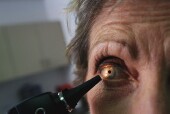- Gelatin vs. Collagen: Which is Best for Skin, Nails, and Joints?
- The Long-Term Effects of Daily Turmeric Supplements on Liver Health
- Could Your Grocery Store Meat Be Causing Recurring UTIs?
- Are You Making This Expensive Thermostat Error This Winter?
- Recognizing the Signs of Hypothyroidism
- 10 Strategies to Overcome Insomnia
- Could Artificial Sweeteners Be Aging the Brain Faster?
- Techniques for Soothing Your Nervous System
- Does the Water in Your House Smell Funny? Here’s Why
- Can a Daily Dose of Apple Cider Vinegar Actually Aid Weight Loss?
FDA OKs New Drug for Diabetes-Linked Eye Condition

The U.S. Food and Drug Administration on Wednesday approved the use of Eylea, an injected drug, to treat diabetic retinopathy in patients with diabetic macular edema.
According to the U.S. Centers for Disease Control and Prevention, diabetic retinopathy is a leading cause of blindness in American adults. A third of those over 40 with diabetes have some form of the eye condition, according to 2008 data, the CDC said.
Overall, more than 29 million people in the United States have type 1 or type 2 diabetes, and diabetes remains the leading cause of new blindness among people aged 20 to 74, the CDC noted.
In some people who have diabetic retinopathy with macular edema, abnormal new blood vessels grow on the surface of the retina. If those new blood vessels break, severe vision loss or blindness can occur.
“The major cause of vision loss occurs when abnormal blood vessels leak, causing retinal swelling also known as macular edema,” explained one expert, Dr. Mark Fromer, an ophthalmologist at Lenox Hill Hospital in New York City.
“Today’s approval [of Eylea] gives patients with diabetic retinopathy and diabetic macular edema another therapy to treat this vision-impairing complication,” Dr. Edward Cox, director of the Office of Antimicrobial Products in the FDA’s Center for Drug Evaluation and Research, said in an agency news release.
Eylea is given by a doctor as an injection into the eye once a month for the first five injections, and then once every two months. It is meant to be used along with measures to control a patients’ blood sugar, blood pressure and cholesterol levels, the FDA said.
The approval is based on the findings from two clinical trials that included a total of 679 diabetic retinopathy patients with diabetic macular edema. They were randomly assigned to receive Eylea or macular laser photocoagulation, a laser treatment that burns small areas of the retina.
After 100 weeks, patients taking Eylea had significant improvement in the severity of their diabetic retinopathy, compared with those who did not receive the drug, the FDA said.
Another expert said that Eylea is just one of a number of recent advances against the disease. For example, in February, the FDA approved Lucentis (ranibizumab) injections to treat diabetic retinopathy in patients with diabetic macular edema.
“In the last few years, multiple new medications and various surgical methods have become available to treat diabetic retinopathy,” said Dr. Nazanin Barzideh, chief of vitreoretinal surgery at Winthrop-University Hospital in Mineola, N.Y.
She said that approved injected medications, “frequently improve vision in the effected diabetics and timely treatment can prevent blindness.” However, Barzideh cautioned that “it is important that new medical and surgical treatments be administered by a retina specialist, as close monitoring is required with all of these new treatments.”
According to the FDA, common side effects with Eylea included bleeding into the tissue that lines the inside of the eyelids and covers the white part of the eyes, eye pain, cataracts, floaters, increased pressure inside the eye, and separation of the interior jelly of the eye from the retina. Serious side effects included infection within the eye and retinal detachment.
Eylea, marketed by Regeneron Pharmaceuticals Inc. in Tarrytown, N.Y., is also approved to treat wet age-related macular degeneration, as well as diabetic macular edema and macular edema secondary to retinal vein occlusions, the FDA said.
More information
The U.S. National Eye Institute has more about diabetic retinopathy.
Source: HealthDay
Copyright © 2026 HealthDay. All rights reserved.










